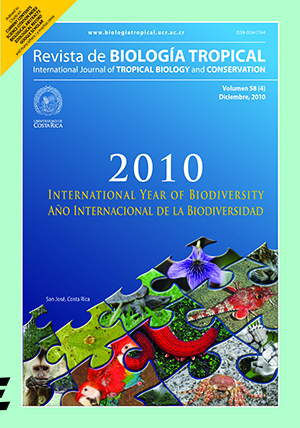Abstract
The coexistence of ecologically similar species may occur because of resources distribution, such as prey and habitat type and segregation time, that minimizes the interspecific competition. The changes brought about by Hurricane Isidore in the distribu-tion of food resources by three coexisting fish species of the family Tetraodontidae (Sphoeroides nephelus, S. spengleri and S testudineus),were analyzed at the Carbonera Inlet. Sphoeroides spp. based their food on benthic organisms; principally, they consume mussels (Brachidontes sp.), barnacles (Balanus sp.) and gastro-pods (Crepidula sp). Before hurricane impact, the three species share the available food resources in different proportions (bivalves, gastropods, barnacles and decapods), according to different strategies that enabled them to coexist and reduce interspecific competition. After the impact, the abundance of available prey decreased and the interespecific competition for food increased, leading to S. testudines and S. nephelus change their trophic spectrum (xiphosurans, amphipods, isopods and detritus) and displacing S. splengleri of the inlet. The distribu-tion of food resources was conditioned by the abundance and diversity of prey, as well as the adaptive response of each species.
##plugins.facebook.comentarios##

This work is licensed under a Creative Commons Attribution 4.0 International License.
Copyright (c) 2010 Revista de Biología Tropical






